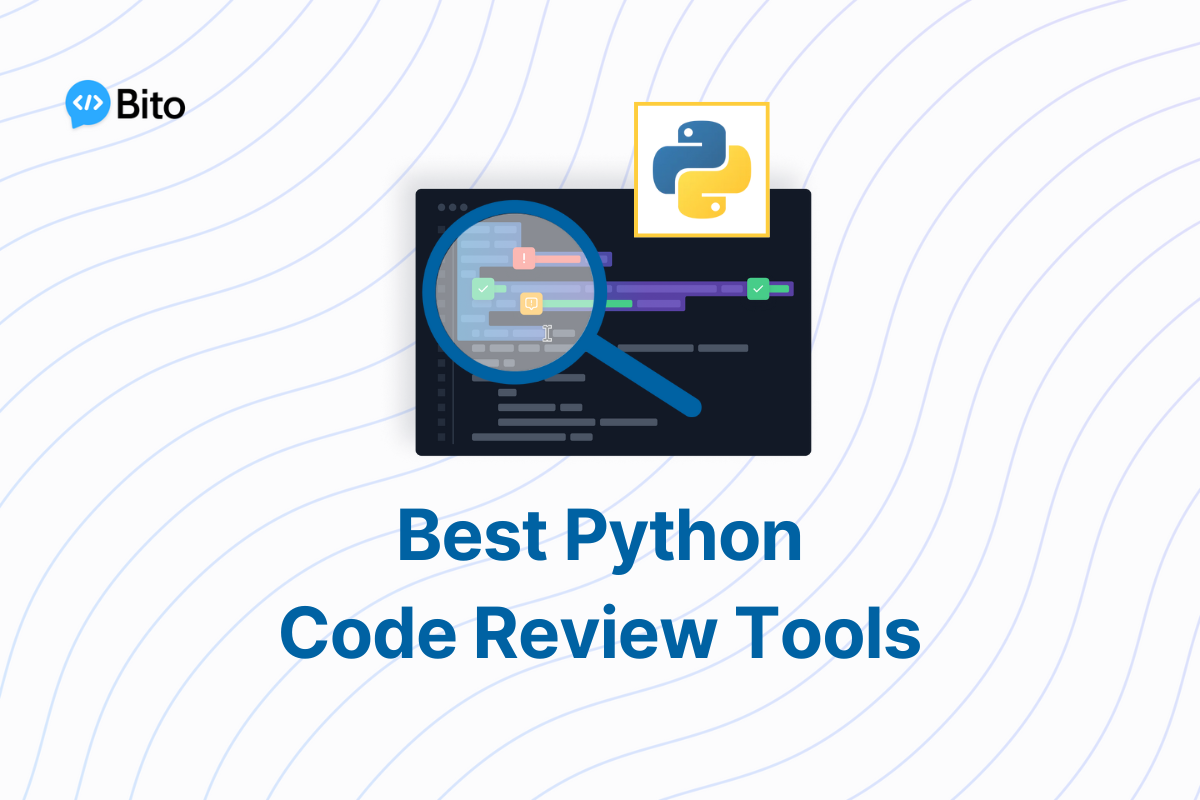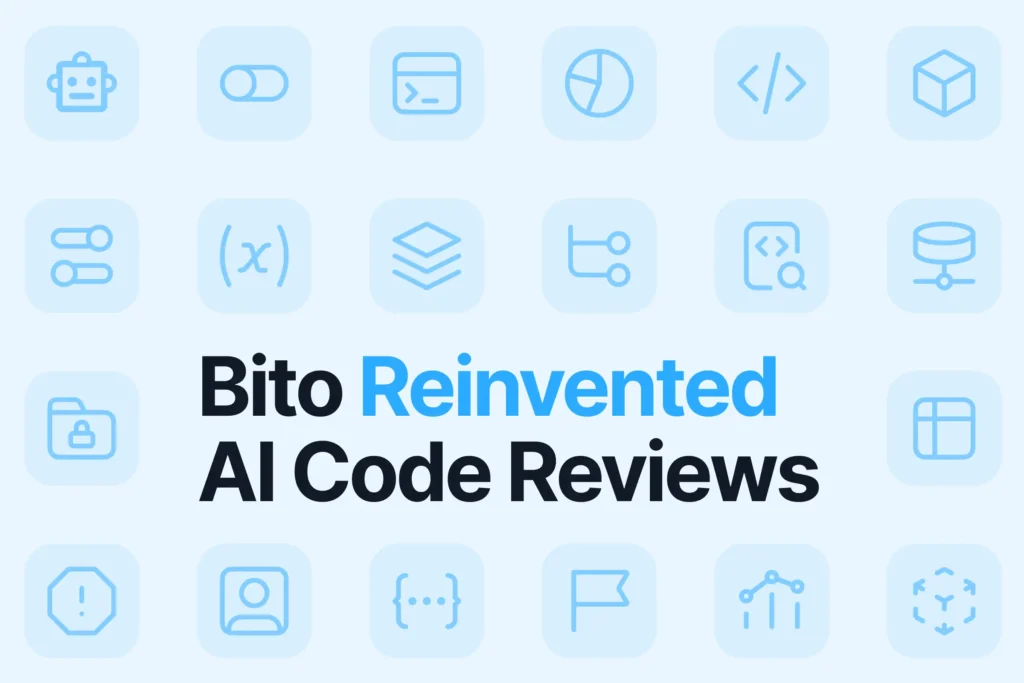Code review is a critical part of software development, especially in Python, where clean, efficient, and secure code is essential. It ensures that every piece of code not only works but follows best practices, is maintainable, and reduces the chance of bugs slipping into production.
However, manual code reviews can be time-consuming and error-prone, especially in large codebases.
This is where code review tools come in to assist developers, making the review process faster, more accurate, and less tedious.
In this article, we’ll explore the best Python code review tools available today. Whether you’re an individual contributor or part of a larger development team, these tools can help streamline your code reviews and ensure top-notch quality in your Python projects.
1. Bito’s AI Code Review Agent
Bito’s AI Code Review Agent stands out due to its deep understanding of your entire codebase. Unlike many tools that review code changes in isolation, Bito analyzes your entire project, providing context-aware feedback. This makes its suggestions more accurate and aligned with your project’s overall structure.
Key Features:
- Context-aware code review: Deep understanding of your code including libraries, frameworks, functionality to provide accurate suggestions.
- PR summary: Quick, comprehensive overviews of pull requests.
- Automated change list: Categorizes and lists changes in a pull request, making it easy to track key updates.
- AI code review: Assesses security, performance, scalability, optimization, impact on existing features, code structure, and coding standards.
- Tailored code suggestions: Precise, line-specific improvement suggestions.
- Static Code Analysis: In-depth analysis with tools like fbinfer and Sonar.
- Security vulnerability check: Uses tools like OWASP Dependency-Check for detecting severe security flaws.
- Supports Git workflows: Works within GitHub, GitLab, and Bitbucket to assist with real-time PR reviews.
- IDE integration: Seamlessly integrated with VSCode and JetBrains for in-editor code reviews.
- Instant feedback in IDE: Provides immediate reviews while you code, reducing the need for back-and-forth in pull requests.
- Supports multiple languages: Works across Python, JavaScript, Go, and more.
2. CodeRabbit
CodeRabbit is another strong player in the Python code review space, offering a clean interface for reviewing code and collaborating with team members. It’s designed to reduce the burden of manual code reviews by highlighting potential issues in real-time.
Key Features:
- Smart code suggestions: Provides context-aware recommendations based on coding standards.
- Seamless integration: Easily integrates with GitHub and GitLab.
- Collaborative review: Allows for easy commenting and collaboration within the pull request.
- AI-powered bug detection: Identifies potential bugs and optimization opportunities.
3. Qodo Merge (formerly Codium PR-Agent)
Qodo Merge offers a unique combination of traditional code review features with AI-powered enhancements. It is designed to help teams perform more efficient and structured code reviews.
Key Features:
- Automated pull request reviews: Leverages AI to analyze code changes in PRs.
- File impact assessment: Highlights which files are most impacted by the proposed changes.
- Customized linting rules: Supports customized linting rules for your specific project needs.
- Security checks: Identifies common security vulnerabilities during reviews.
4. DeepSource
DeepSource goes beyond simple code review to include static analysis and performance monitoring. It ensures not only that your code is correct but also optimized for performance and security.
Key Features:
- Automated issue detection: Identifies bugs, performance issues, and security vulnerabilities.
- Built-in refactoring suggestions: Helps improve code readability and maintainability.
- Seamless CI/CD integration: Easily integrates into existing CI/CD pipelines.
5. Sourcery
Sourcery is focused on making your Python code cleaner and more readable by suggesting refactors as you write it. It’s like having an intelligent assistant guiding your coding practices.
Key Features:
- Real-time refactoring suggestions: As you write code, Sourcery suggests how to improve it.
- Code complexity analysis: Highlights areas where code complexity can be reduced.
- Integrates with popular IDEs: Works well with VSCode, PyCharm, and GitHub.
- Customizable rulesets: Tailor code suggestions to your team’s best practices.
6. Pylint
Pylint is a highly popular linting tool in the Python community. Its extensive rule sets allow it to catch a wide range of issues from style violations to logical errors.
Key Features:
- Extensive rule set: Comes with a broad range of default rules for code quality checks.
- Customizable linting: You can tailor the rules to your project’s needs.
- Detects common errors: Catches issues like variable misuses, bad imports, and more.
- Integrated with CI/CD pipelines: Can easily be run as part of your build process.
7. Bandit
Bandit focuses on security. It’s designed to find common security vulnerabilities in Python code by scanning for known issues and bad practices.
Key Features:
- Security vulnerability detection: Identifies security flaws such as SQL injection risks.
- Customizable scans: Allows for custom security rules tailored to your project.
- CI/CD integration: Can be easily integrated into CI/CD pipelines for continuous monitoring.
- Lightweight: Fast and efficient, doesn’t slow down your development process.
8. Codacy
Codacy is a code review tool focused on automating checks for code quality, security, and performance. It supports multiple programming languages, including Python.
Key Features:
- Automated code review: Reviews code for security, performance, and style issues.
- Supports over 40 languages: Works with Python, JavaScript, Go, and more.
- Git integration: Seamlessly integrates with GitHub, GitLab, and Bitbucket.
- Customizable rules: Supports team-specific code review rules and guidelines.
Conclusion
Code reviews are essential for maintaining code quality, security, and readability in any Python project. But doing them manually takes a significant amount of time and effort, especially as your codebase grows.
AI-powered tools, like those discussed in this article, can help automate and streamline the process, saving time while ensuring your code is as clean and efficient as possible.
Among all the tools, Bito’s AI Code Review Agent stands out as the best option. With its full codebase understanding, context-aware feedback, and seamless integration into both Git workflows and IDEs, it provides unparalleled support to developers looking for faster, smarter, and more effective code reviews. If you’re serious about improving your Python code reviews, Bito should be your go-to tool.






